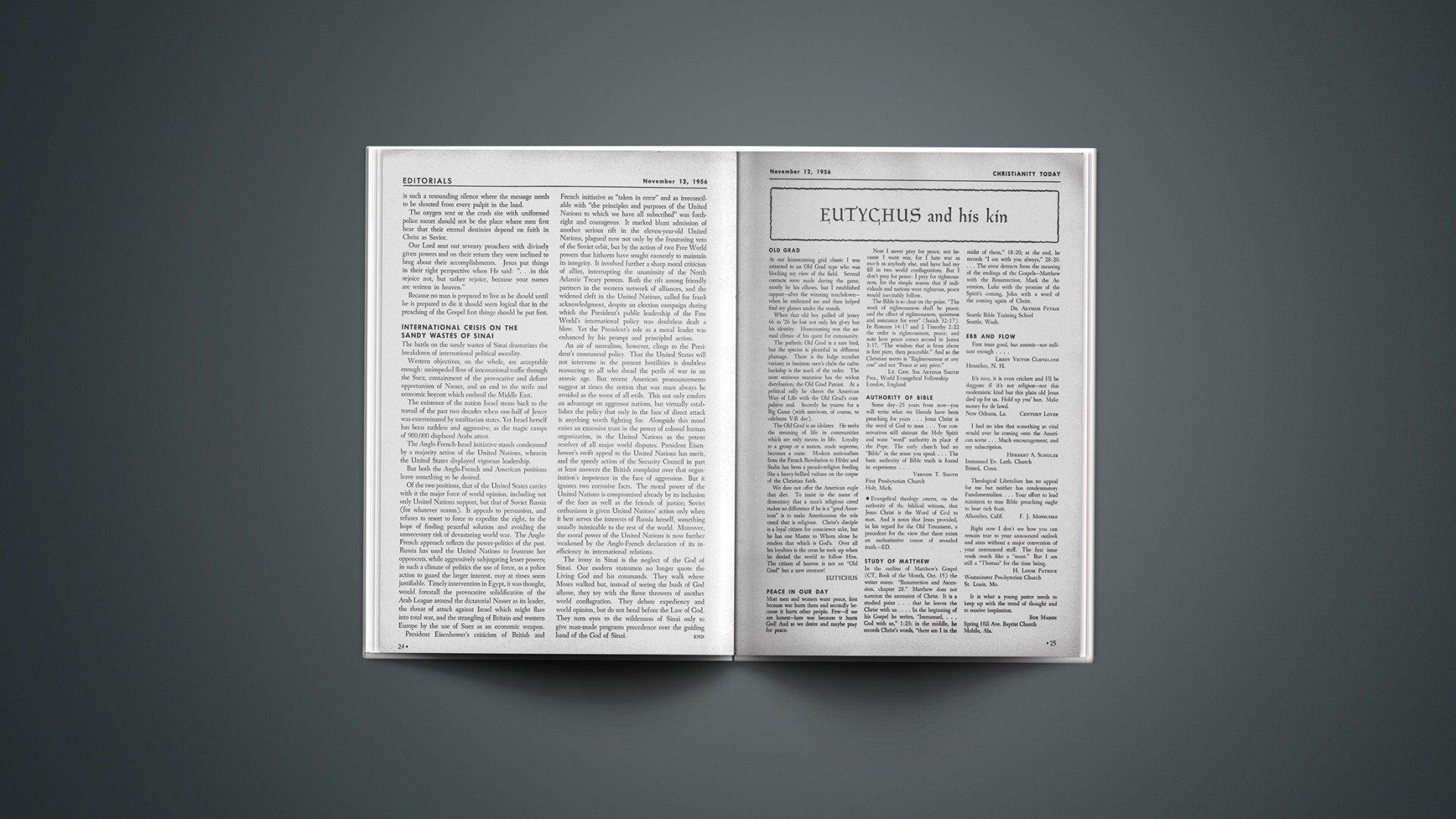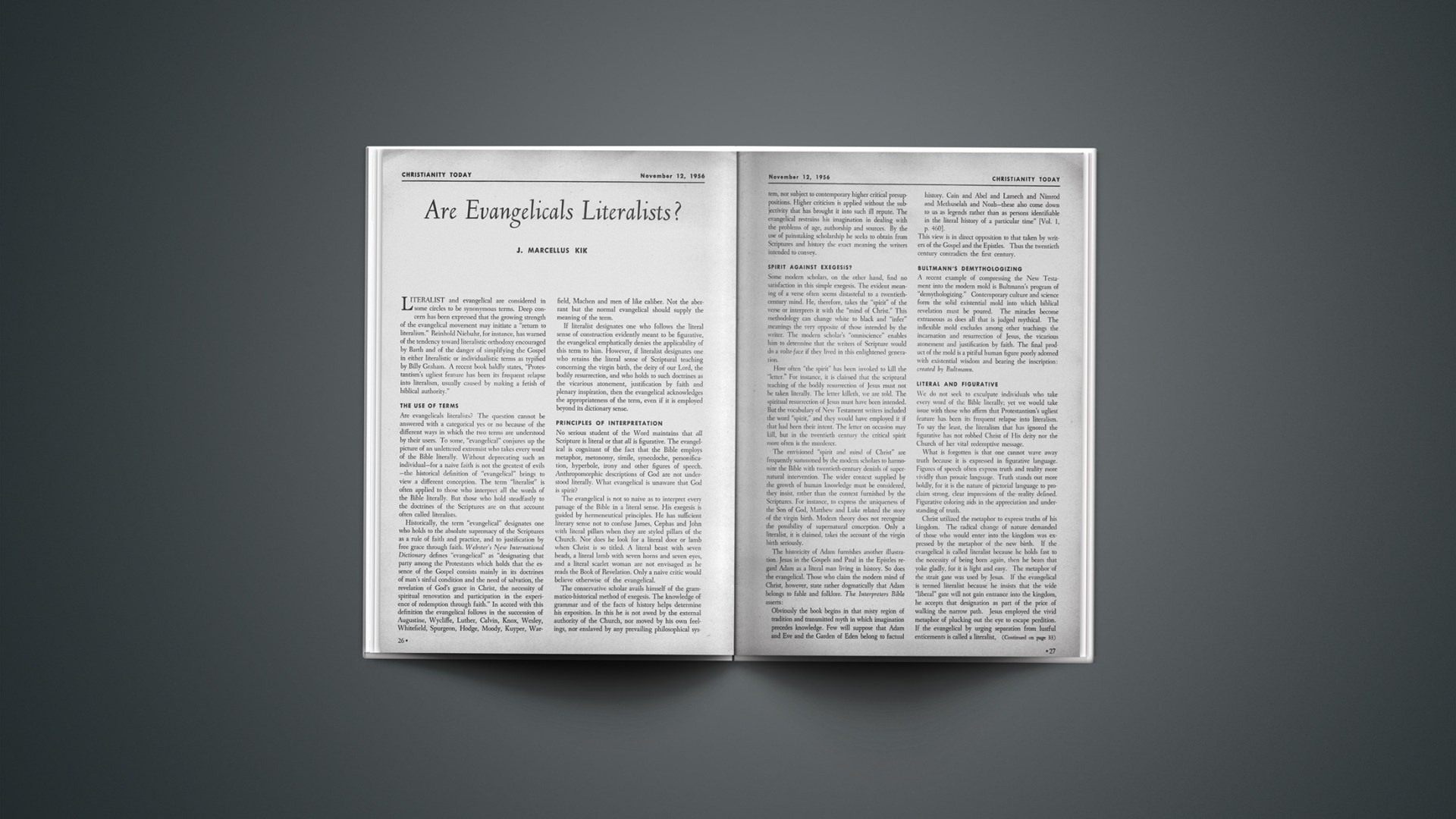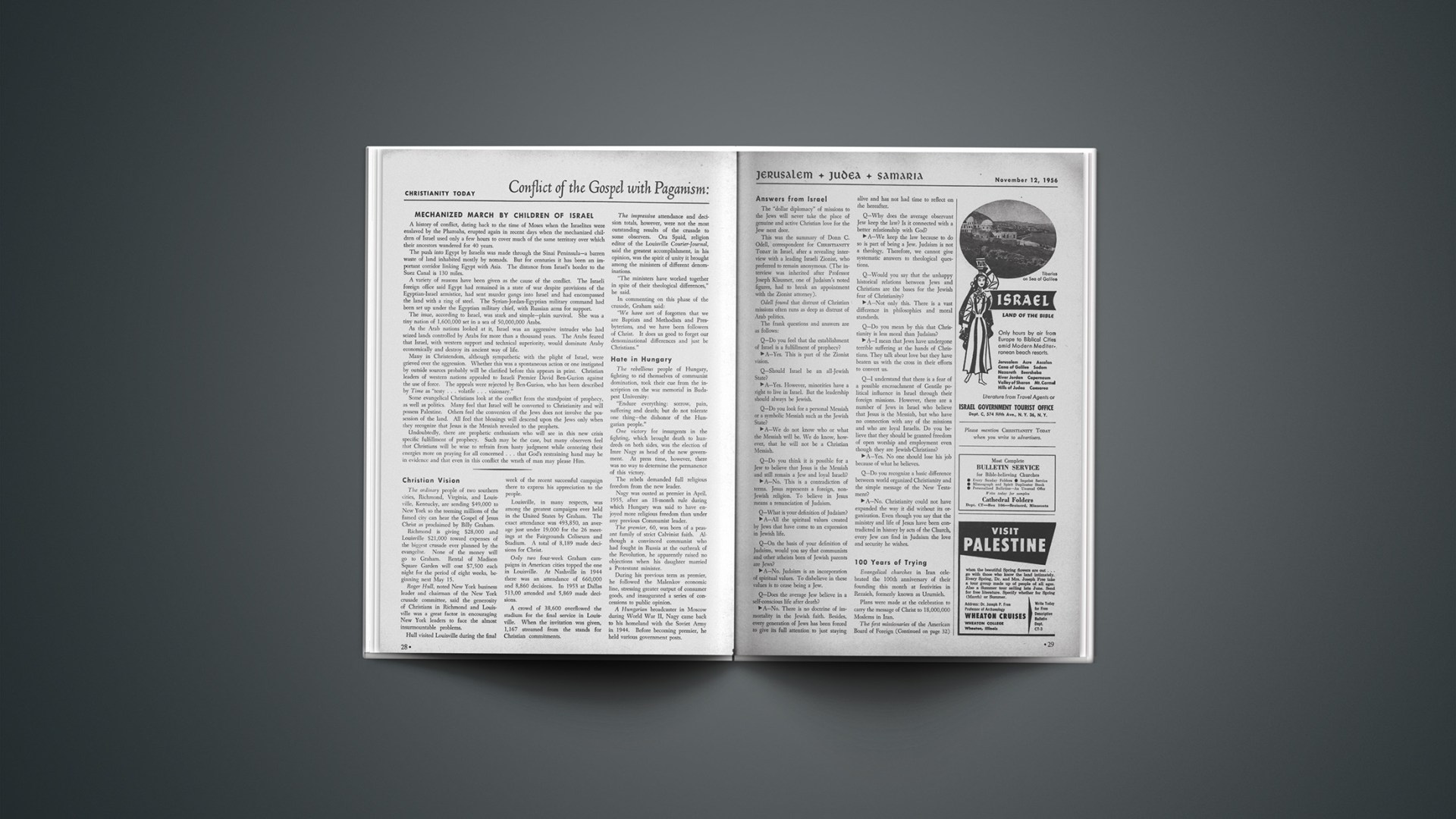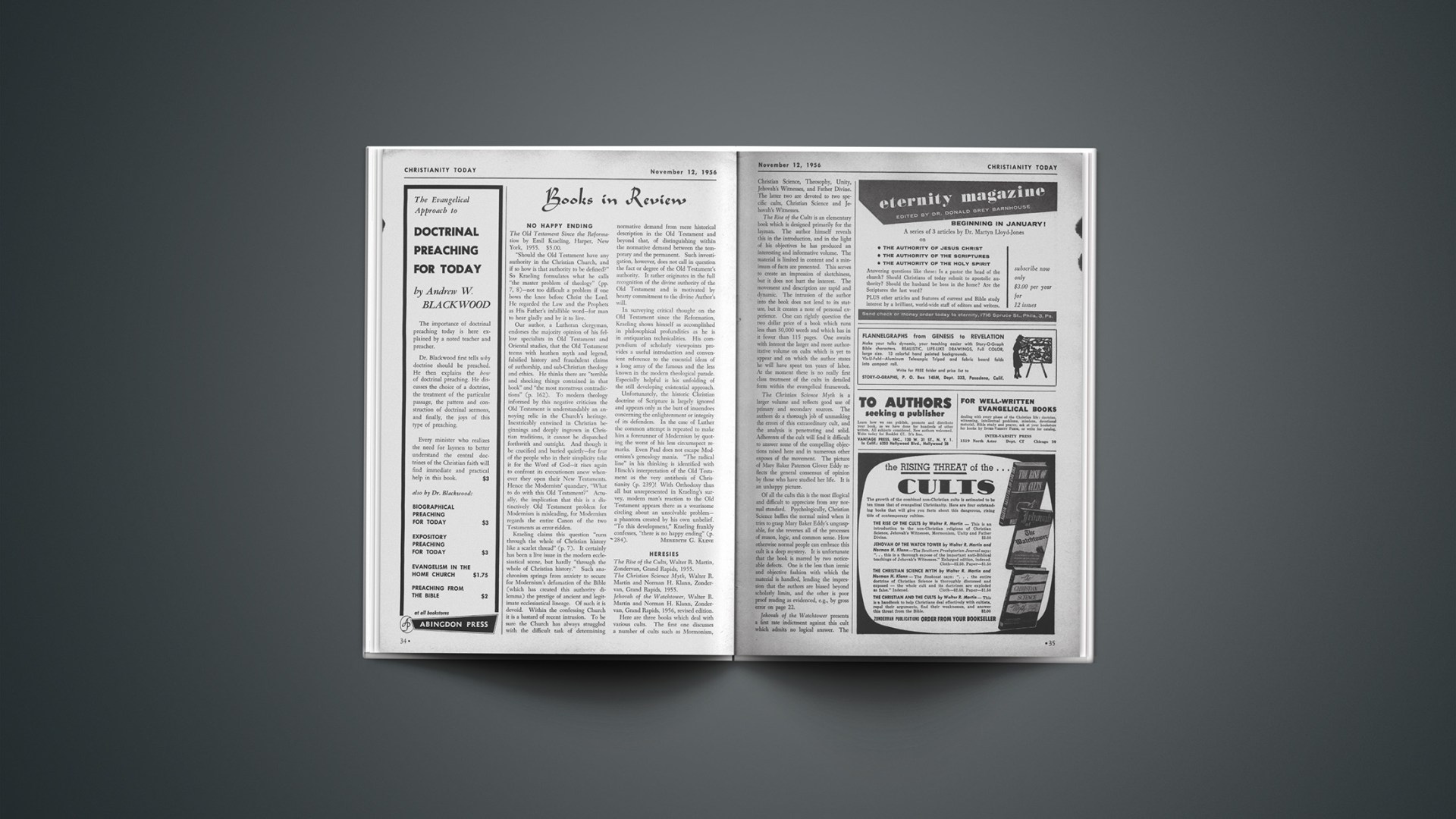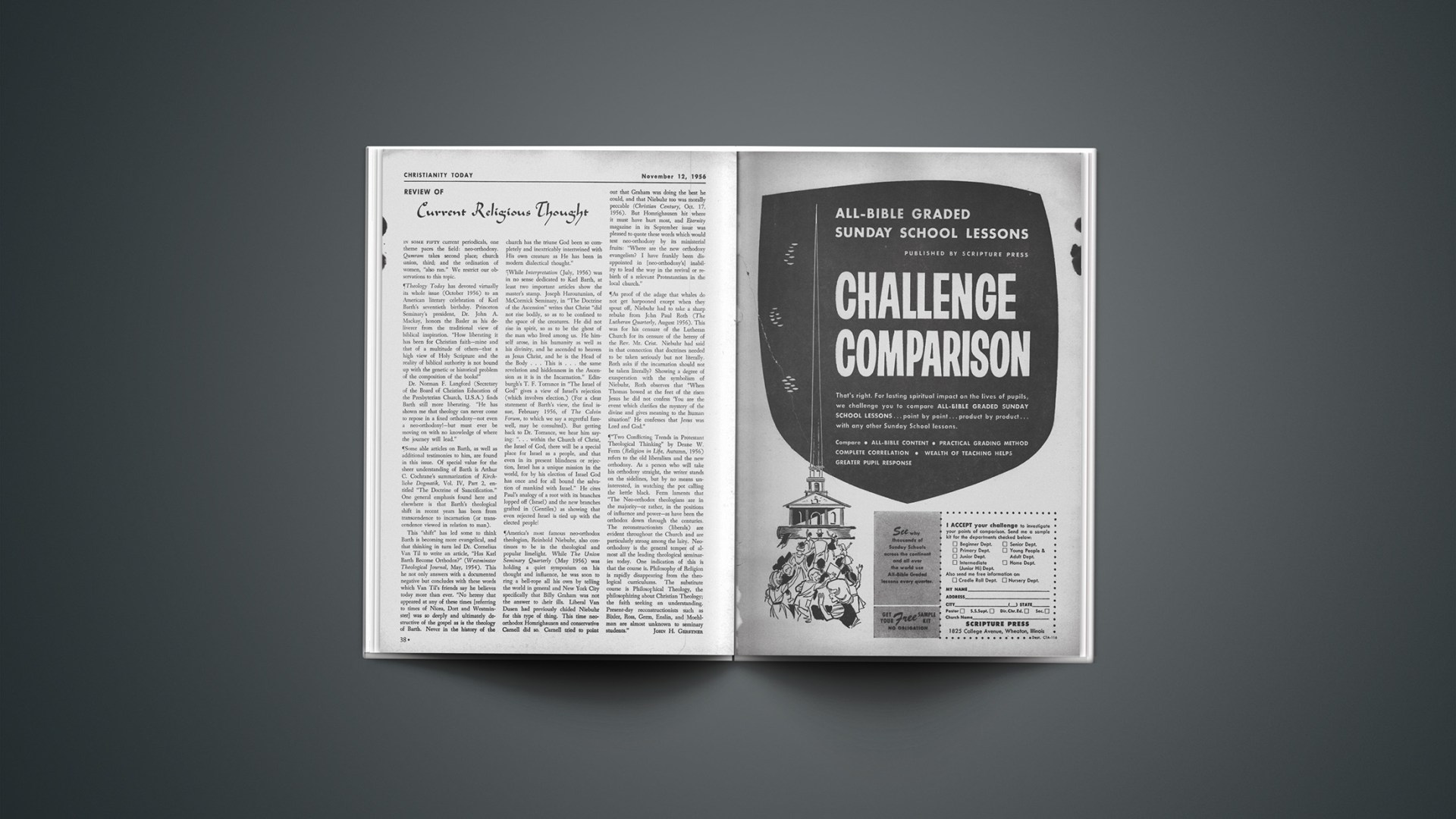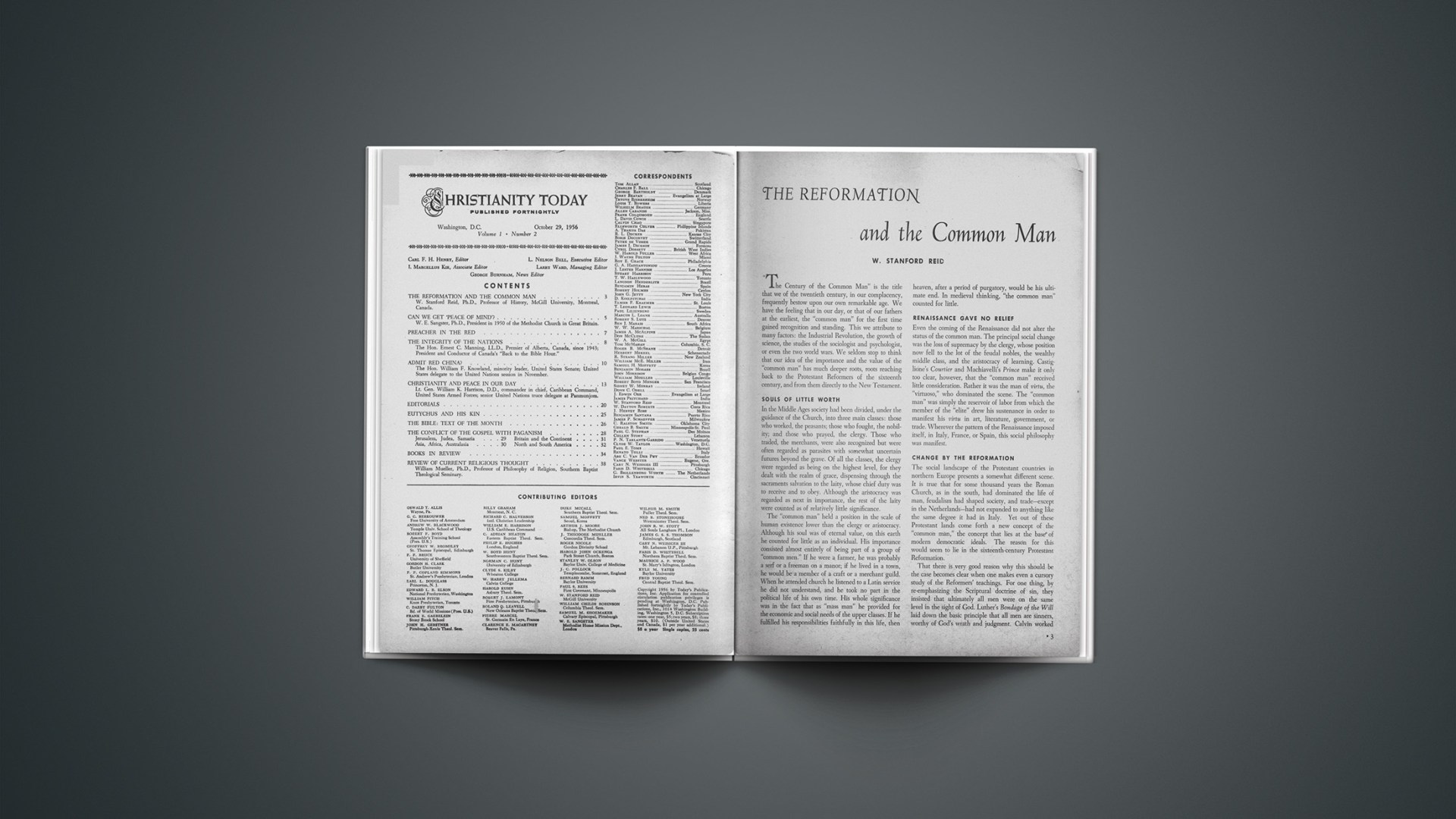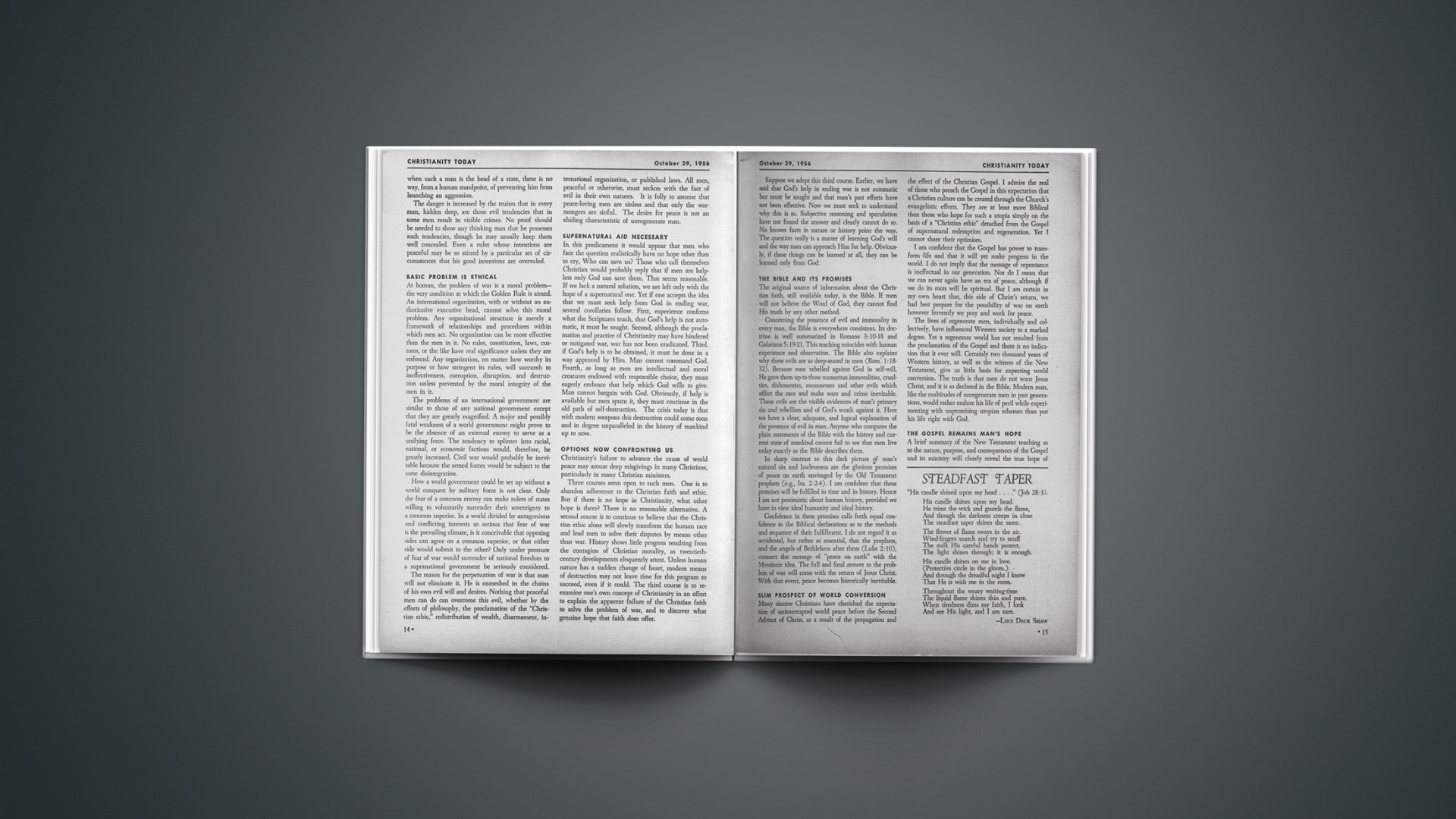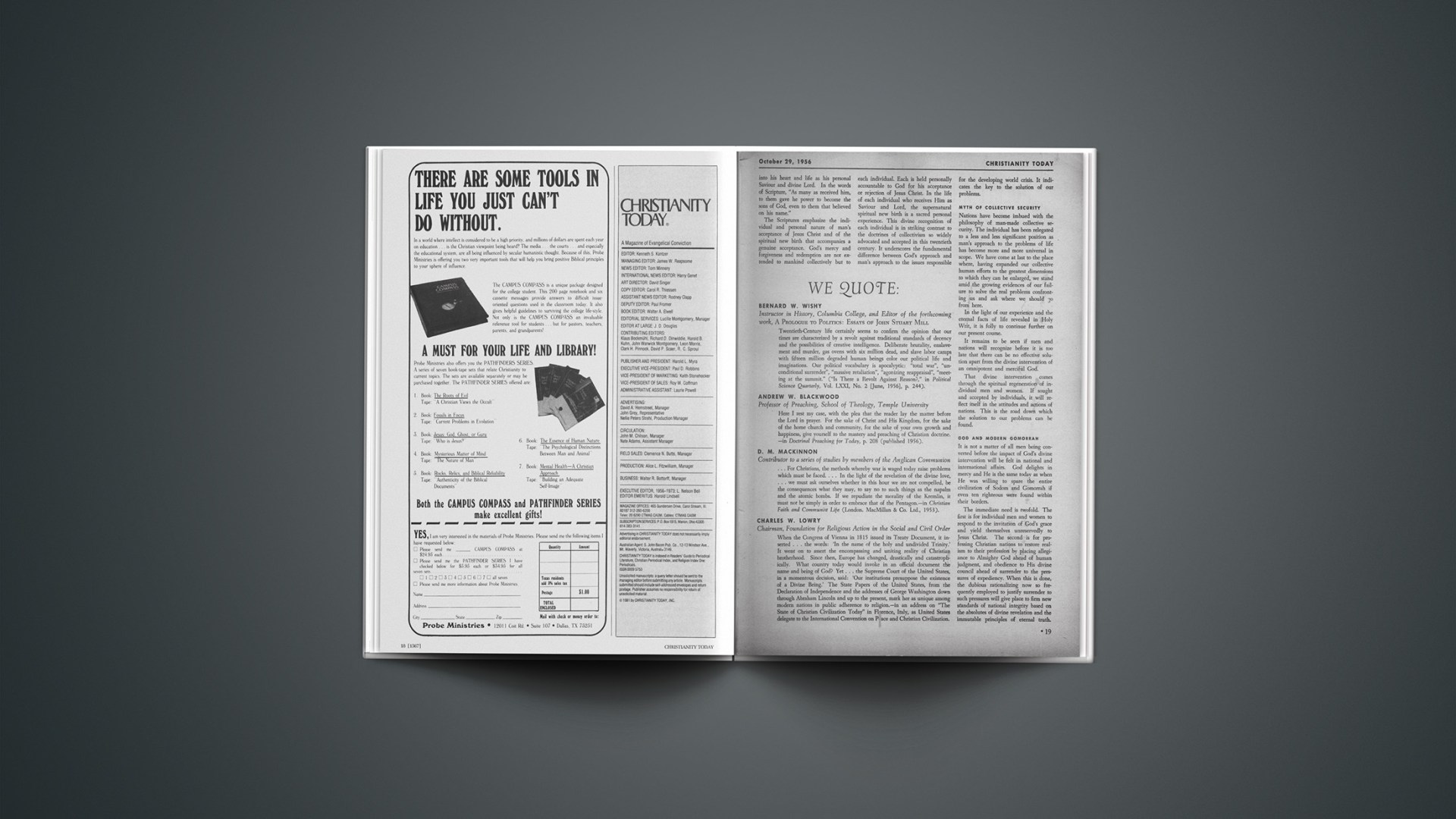The contemporary American church scene discloses significant spiritual trends. Tendencies originating obscurely in the past have now assumed forms quite obvious to the students of religious life.
American Christianity is dynamic, not static. It exists in a shifting historical situation, not in a vacuum. The visible church cannot fully escape this fact of historical change as the climate of the day. From day to day, reactions to it may appear quite imperceptible; in the span of a generation they will become quite apparent, and may even be cataclysmic.
The Protestant Reformation in the sixteenth centurn represented a break with both the doctrines and the hierarchy of Romanism. Justification by faith alone was not the only cardinal theological tenet of the Reformers. Intrinsic in the movement of reform was a desire to break with the suzerainty of Rome. Against the papal claim of ultimate authority in the Church and thus in the pope of Rome, the Reformers re-elevated to authority the written Word of God as the sole regulator and restrainer of conscience.
Protestant churches became independent and autonomous bodies, although often within the framework of national states. Yet in many instances independency, or existence outside these bodies, was not tolerated. The nonconformists in England were viciously persecuted. In Lutheran countries, Baptists and others eked out an uncomfortable survival. Even in early America, often pictured as the land of religious freedom, the same situation prevailed. In New England, for example, dissenters from the Puritan hope were exposed to the wrath of persecutors. Roger Williams, Henry Dunster and Ann Hutchinson shared in it personally.
*
More recently, certain trends in the United States have brought into sharp focus at least two virtually contradictory forces operating in community religious life. These forces are diametrically opposed, representing ultimates or extremes. Beyond them, it is impossible to move much to the right or to the left. These forces have not reached their limits in either case, but are headed in the direction of ultimates. But these two movements do not hold the field alone, for between these antitheses, other groups stand uncomfortably exposed to the pressures of history, keenly conscious that the immoderate forces of extremity bode ill for Protestantism.
The two clashing movements of which we speak are Independency and Organic Church Union, embodied in agencies familiar to all. Their conflicting tendencies are visible in the big cities and the tiny hamlets of the nation. The Independents could be illustrated by many diverse groupings, but the extreme right wing is the American Council of Christian Churches, which finds its larger orientation in the International Council of Christian Churches. Organic Church Union could be represented in its most intense form by the National Council of Churches of Christ in the U.S.A., which is integrated within the framework of the World Council of Churches.
Each has its own tensions and perils. Independency tends to be intolerant, Church Unionism to be tolerant. The former moves in the direction of exclusivism, the latter toward inclusivism. One holds a low view of the Church in its visible and historical aspects, and the other a high view. The one glorifies separateness, while the other reaches out toward ecclesiasticism. Independency remains highly creedal in minute detail, while Church Unionism becomes vague and ill-defined in theological basis. One can easily become Pharisaic, the other Sadducean.
*
Some may object to any implication that Church Unionism is well-nigh creedless, pointing to the Thirty-Nine Articles of Anglicanism, the Westminster Confession of Presbyterianism and the Canons of the Synod of Dort of the Reformed churches. But Church Unionism relegates creeds to a peripheral position. With the statement that Jesus Christ is Lord and Savior, the forces of Organic Union halt, and even this affirmation they leave to whatever interpretation a particular group within the Council may wish to put upon it.
By contrast, Independency has become more and more creedal. And, with its dissociation from organized Christianity, this movement has frequently incorporated secondary doctrines into its creeds with an absoluteness that is incredible. A particular brand of millennialism or an insistence on a dispensational pretribulation rapture of the Church is a case in point. Not long ago Western Baptist Theological Seminary in Portland, Oregon, was divided and its faculty scattered over just such concerns. Its creedal statement, which could not be changed legally, was interpreted to require a pretribulation rapture, so that the creedal statement itself was supplemented by the interpretation, and institutional rupture was the result.
Between Independency and Church Unionism stand the middle parties. Many of them have found a mutual ground in the National Association of Evangelicals. Consciously or unconsciously this group is opposed in temper to both the American Council and the National Council. But its position is not so easily defined, since the lines are not so sharply drawn. It subscribes to some concepts of each of the extremist groups, but opposes others, finding its rationale in a mediating view, or perhaps better described as a perspective above the extremes. Extreme positions are easier to perceive and less difficult to defend to the popular mind. Whether they are truer is a matter for debate.
We do not purpose on this occasion to discuss the problems of Organic Church Union, but to speak rather of the perils of Independency. What we say should not, therefore, be construed as a blanket condemnation of Independency. We merely point out dangers inherent in Independency in the movement of contemporary Church history, and indicate some factors with which its adherents must reckon.
*
One major truth about the foundations of Independency must first be stated. This movement is grounded in a desire to defend the orthodox faith by exalting the Word of God and glorifying the Christ of the Scriptures. Whatever disagreements and errors exist within the extremes of the movement, those who honor fidelity to doctrine cannot but endorse the concern for theological soundness. Such a high goal, however, gives its adherents no automatic guarantee against a blundering course, nor does it, by itself, safeguard the movement of Independency from shipwreck. Indeed, failure to avoid the pitfalls peculiar to Independency can bring about the deterioration and destruction of the movement in a single generation. Independency is as answerable to the verdict of history and as susceptible to the judgments of God as any other movement.
Independency tends to produce a divisive spirit. It refuses to cooperate even with those with whom it is in essential theological agreement. Its concept of separation forbids fellowship with men sound in the faith but associated with objectionable movements. It indicts others for allegiances they have held for years, and often promotes a divisiveness that is disruptive.
Independency usually begins, as we have noted, as a movement against heresy or apostasy. Where this is true it cannot be accurately labeled as divisive. No one can justly inveigh against that form of Independency which comes out of apostasy and holds to a positive doctrinal witness.
But in many instances the apostasy condemned by Independency is not as clearly discernible as is assumed. The movement sometimes arrogates to itself judgment belonging to God. Even though concern for doctrine is necessary, a spirit of divisiveness may be stimulated so that a good end is subordinated and the danger of an evil one looms large. The form of separation with which a movement originates often tends to deteriorate, and internal divisiveness may even raise doubts over the justification of the original separation. Recent history eloquently confirms this danger, and indeed supplies new evidence that the danger stage has passed into ugly historical fact.
Years ago the Presbyterian Church in the U.S.A. witnessed a movement of separation marked by the formation of the Independent Board for Presbyterian Foreign Missions. Led by men like J. Gresham Machen, this movement resulted in the formation of the Orthodox Presbyterian Church. While this denomination was committed to carry out Presbyterian principles of government, the independent spirit within the new group occasioned further fragmentation as evidenced by the establishment of the Bible Presbyterian Church and Faith Theological Seminary. More recently, further division has taken place, caused by a clash of personalities rather than differences of doctrine. Faith Theological Seminary has been rent asunder and a new college and seminary, Covenant, has been formed in St. Louis, Missouri.
*
Two educational institutions have been involved in recent schisms. Highland College of Los Angeles, a strict separationist institution, lost its president and members of the faculty to the new Covenant College, after an internal upheaval among men of like faith. A similar situation exists at Shelton College. Originally located in New York City under the name of the National Bible Institute, it was wooed into the framework of the American Council of Christian Churches. Then its properties were disposed of, a new location in New Jersey found, and the name changed to Shelton College. J. Oliver Buswell, Jr., who was among the early separationists from the Presbyterian Church in the U.S.A. and who had separated from the Westminster-Machen forces, was now caught in the toils of a new schism. Deposed from the presidency of Shelton College, deprived of his chair at Faith Theological Seminary, he joined in the establishment of Covenant College in St. Louis.
The charge of apostasy or modernism has occasioned none of these divisions since the original departure from the Presbyterian Church in the U.S.A. The divisive spirit that led to new splits was in no sense related to the heart of theological orthodoxy. Independency, clearly, is involved not only in tension with theological infidelity outside, but with the divisive temper inside.
The divisiveness of Independency becomes so highly exclusive that it excludes true believers from its fellowship. Herein lies one of the great misfortunes of extremism on the right. Because Independency by definition is dogmatic and because extreme dogmatism is often conducive to a condemnatory spirit, the unity of the Spirit is easily quenched. True believers are separated one from another. Afraid for the safety and purity of its movement, Independency erects thicker and higher hedges for self-protection. As it moves in the direction of Phariseeism, man-made appendages to the Gospel become all-important, constituting a test for fellowship. Not one’s belief in Christ as God and Savior but whether one sits in the right millennial pew, and properly dots every “i” and crosses every “t” according to the approved subsidiary requirements, is determinative. Ultimately, this chokes orthodoxy in the maze of the peripheral; it majors in minors, departing from the heart of the true faith while protesting that it alone possesses the “real” truth.
*
Another peril of Independency lies in its refusal to communicate with those with whom it is in disagreement. This results often in shocking rudeness and incivility. It refuses to reckon with the possibility that other camps may hold sincere and earnest seekers after truth. Independency sometimes labors under the suspicion that whoever is unaffiliated with it, if not a rascal, is at least an eccelesiastical enemy. Whether this suspicion arises from a deep-seated inferiority or from the misunderstanding of “compromise” is hard to judge. But woe betide the orthodox brother caught in conversation with the “opposition.” The scourge of the brethren, or a high-level brain washing, is his ministerial prospect. The ideal of separation from “the apostasy” is stretched to exclude traffic with the persons who converse with those infected with the disease.
Independency is tempted easily to use a vocabulary of stigma and reproach. It draws a razor-thin dividing line and everyone is judged by its cut. Deviationism leads swiftly to vicious name calling. Two words common to the vocabulary of Independency are “compromise” and “modernist.” Whoever does not conform closely to the “line” is likely to be accused either of compromise or of Modernism. Differences over minor points of eschatology have resulted in charges of latent Modernism, or of compromise of the historic faith, leveled against some of the most competent defenders of the evangelical position. It is true enough that Modernism has its own vocabulary, and can use it for sharp ends, but this does not excuse Independency for the same vice. “Scapegoating” in its ecclesiastical form has done much to harm the reputation of men true to the Word of God, and to destroy the confidence in them of other true believers, especially among weaker brethren anxious to believe any charge uttered by the tribal council.
But the most serious deficiency of Independency is its departure from the New Testament theology of the Church. If any teaching is clear in the New Testament, it is the teaching of the unity of the true body of Christ. A transcendental outlook detaches Independency from the present historical scene in relation to the heavenly and otherworldly side of life. This detachment produces more and more fragmentation, and encourages militant opposition to efforts looking toward an undivided Church. While concentrating on the heavenly body, or the invisible Church, Independency often loses sight of the empirical Church in history, and fails to realize its own continuity with this historical phenomenon. “Not of this world” is unfortunately and erroneously taken to be the virtual equivalent of “not in this world.” But Christianity teaches an ambivalence the Church cannot escape: it is both “not of this world” and “in this world” at the same time.
If Independency is not to disintegrate in riot, it must reconstruct its theology of the Church in the light of biblical teaching. The solution of its related problems does not lie in easy acquiescence to a completely separationist and divisive philosophy. There is a biblically defined unity of the body, even in diversity. The witness of believers can never be wholly transcendental. The Church has empirical as well as transcendental aspects, and neither can be overlooked without impairing the biblical view.
*
Perhaps among the very grave problems of Independency is the lurking assumption that true Independency implies individualism. What frequently has been characterized as identification with Independency is individualism of an unrestrained and frightening sort. This individualism stresses the autonomy of the human spirit while professing to be shackled to divine revelation and repudiating dependency upon other human beings in this relationship to God. True biblical Independency is essentially a group enterprise, banding together men of like mind and spirit for the preservation of what they believe to be true. Only where two or three are gathered together with Christ in their midst is there a true church. Refusing subjection to superior ecclesiastical powers and authorities. Independency has in it the seeds of individualism. When Independency allows these seeds to germinate, the fruit ripens into the man who becomes a law unto himself, even though he may attempt to validate his proclamations and deeds on the assumption that they are performed for the glory of Christ. The biblical Christian knows nothing of such individualism. No man is a law unto himself; each is to be subject to the brethren, and no one person can make himself the arbiter and judge of others.
Independency run riot produces individualism in the end, as depicted in the Old Testament where we are told that in some areas every man did what was right in his own eyes. Independency may be the spawning ground of spirits not truly in the tradition of Independency, but in the tradition of individualism. The end of individualism is a “church” in which each man is his own ministry and congregation, ruler and subject, making and judging his own laws. In such an assembly there is little regard for Jesus Christ, the Head of the Church, or for fellow believers who make up the visible body of Christ on earth.
One dare not charge that all who are identified with Independency have succumbed to these tensions and dangers. Nor can it be fairly alleged that the whole movement has succumbed to them. But the dangers have been actualized sufficiently to indicate the historical direction if the movement continues on its present path. Undoubtedly many adherents within the camp of Independency are not victims of the defects we have outlined, and their catholicity of spirit and irenic pursuit of the truth are exemplary. They embrace the doctrine of Christ in the spirit of Christ. While subject to the temptations and tensions common to Independency, they have not yielded to them. They are the hope of their movement, and the guidance they give or fail to give may be the decisive factor that will avert or lead to a complete disintegration.
Independency will collapse if it surrenders to its peculiar temptations. Contrariwise, it can help to purify the Christian Church. To purify without destroying, and without being destroyed, is its critical challenge in the movement of Church history.
[Editor’s note: See also the next issue’s follow-up editorial, “The Perils of Ecumenicity.”]
***
Is The Church Too Silent About Personal Morality?
In writing the Colossian Christians, Paul indicts sins found on every hand today: “Have nothing to do with sexual immorality, uncontrolled passion, evil desire, and the lust for other people’s goods.…”
Americans are now faced with immorality paraded in attractive guise by almost every media of entertainment. That the Church seldom speaks out against this evil is a strange phenomenon.
Why this silence? The Bible says that because of these very things the holy anger of God falls on those who refuse to obey. By this token God’s judgment hangs over America at this very minute.
Any reference to puritanism will bring either a sneer or the raised eyebrows of a people sated by twentieth century sophistication. But unless there is a Spirit-led return to those moral standards so plainly stated in the Bible, and from which we have departed so far, how can God’s holy wrath be deferred?
This is a matter of the first magnitude. National survival and individual souls are at stake. Parents are confronted with decisions which will gravely affect their children. Never has a generation of young people had access to licentiousness, in its deadly effects, as in the case of teen-agers today.
Certainly there has never been a greater need for the Church to assert herself for holy living.
Raise in a church council a question on Christian race relations, and an almost unanimous response is assured. Raise the question of moral conduct, and often there is little effective reaction.
One does not have to choose one course of righteousness at the expense of another. It is the obligation of the Church to show concern in many areas of life. But at the present time individual Christians and the Christian Church are far too silent about the immoral concepts that are gaining ascendency in the thinking and living of the multitudes.
For the sake of all concerned let the Church speak up.
Majoring On The Minor In Contemporary Preaching
There is an amazing deficiency in much of contemporary preaching, a lack of the one thing which lies at the heart of the Gospel message. The average sermon is so concerned with telling men how to live that there is little or no room for the question of prior importance: how to die.
The jailor at Philippi was enmeshed in Roman colonialism at one of its seamiest outposts. Suddenly he was confronted with a crisis involving two men who knew the answer to life’s most important question. His eager inquiry: “Sirs, what must I do to be saved?” brought a direct answer: “Believe on the Lord Jesus Christ, and thou shalt be saved, and thy house.”
There is no more superlative text today. Nor is there any other adequate answer. Strange that there is such a resounding silence where the message needs to be shouted from every pulpit in the land.
The oxygen tent or the crash site with uniformed police escort should not be the place where men first hear that their eternal destinies depend on faith in Christ as Savior.
Our Lord sent out seventy preachers with divinely given powers and on their return they were inclined to brag about their accomplishments. Jesus put things in their right perspective when He said: “… in this rejoice not, but rather rejoice, because your names are written in heaven.”
Because no man is prepared to live as he should until he is prepared to die it should seem logical that in the preaching of the Gospel first things should be put first.
International Crisis On The Sandy Wastes Of Sinai
The battle on the sandy wastes of Sinai dramatizes the breakdown of international political morality.
Western objectives, on the whole, are acceptable enough: unimpeded flow of international traffic through the Suez, containment of the provocative and defiant opportunism of Nasser, and an end to the strife and economic boycott which embroil the Middle East.
The existence of the nation Israel stems back to the travail of the past two decades when one-half of Jewry was exterminated by totalitarian states. Yet Israel herself has been ruthless and aggressive, as the tragic camps of 900,000 displaced Arabs attest.
The Anglo-French-Israel initiative stands condemned by a majority action of the United Nations, wherein the United States displayed vigorous leadership.
But both the Anglo-French and American positions leave something to be desired.
Of the two positions, that of the United States carries with it the major force of world opinion, including not only United Nations support, but that of Soviet Russia (for whatever reason). It appeals to persuasion, and refuses to resort to force to expedite the right, in the hope of finding peaceful solution and avoiding the unnecessary risk of devastating world war. The Anglo-French approach reflects the power-politics of the past. Russia has used the United Nations to frustrate her opponents, while aggressively subjugating lesser powers; in such a climate of politics the use of force, as a police action to guard the larger interest, may at times seem justifiable. Timely intervention in Egypt, it was thought, would forestall the provocative solidification of the Arab League around the dictatorial Nasser as its leader, the threat of attack against Israel which might flare into total war, and the strangling of Britain and western Europe by the use of Suez as an economic weapon.
President Eisenhower’s criticism of British and French initiative as “taken in error” and as irreconcilable with “the principles and purposes of the United Nations to which we have all subscribed” was forthright and courageous. It marked blunt admission of another serious rift in the eleven-year-old United Nations, plagued now not only by the frustrating veto of the Soviet orbit, but by the action of two Free World powers that hitherto have sought earnestly to maintain its integrity. It involved further a sharp moral criticism of allies, interrupting the unanimity of the North Atlantic Treaty powers. Both the rift among friendly partners in the western network of alliances, and the widened cleft in the United Nations, called for frank acknowledgment, despite an election campaign during which the President’s public leadership of the Free World’s international policy was doubtless dealt a blow. Yet the President’s role as a moral leader was enhanced by his prompt and principled action.
An air of unrealism, however, clings to the President’s announced policy. That the United States will not intervene in the present hostilities is doubtless reassuring to all who dread the perils of war in an atomic age. But recent American pronouncements suggest at times the notion that war must always be avoided as the worst of all evils. This not only confers an advantage on aggressor nations, but virtually establishes the policy that only in the face of direct attack is anything worth fighting for. Alongside this mood exists an excessive trust in the power of colossal human organization, in the United Nations as the potent resolver of all major world disputes. President Eisenhower’s swift appeal to the United Nations has merit, and the speedy action of the Security Council in part at least answers the British complaint over that organization’s impotence in the face of aggression. But it ignores two corrosive facts. The moral power of the United Nations is compromised already by its inclusion of the foes as well as the friends of justice; Soviet enthusiasm is given United Nations’ action only when it best serves the interests of Russia herself, something usually inimicable to the rest of the world. Moreover, the moral power of the United Nations is now further weakened by the Anglo-French declaration of its inefficiency in international relations.
The irony in Sinai is the neglect of the God of Sinai. Our modern statesmen no longer quote the Living God and his commands. They walk where Moses walked but, instead of seeing the bush of God aflame, they toy with the flame throwers of another world conflagration. They debate expediency and world opinion, but do not bend before the Law of God. They turn eyes to the wilderness of Sinai only to give man-made programs precedence over the guiding hand of the God of Sinai.


